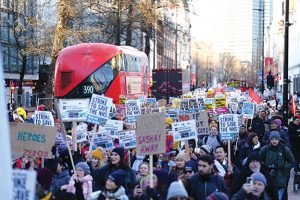Bloomberg
Close to half a million workers are ready to strike on a single day as Britain faces an escalation of industrial action across a number of sectors.
Unions representing civil servants, teachers, university staff and train drivers have said their members will walk out on Feb. 1 as part of demands for higher pay to cope with the worst cost-of-living crisis in a generation.
About 450,000 workers have a mandate to strike, according to Bloomberg calculations. If all the union members took up their right, the day’s industrial action would come close to matching every walkout throughout the whole of November.
The Office for National Statistics said this week that 467,000 working days were lost to strikes in November — itself a 10-year high.
Nearly 100,000 civil servants said last week they would strike on Feb. 1 as part of a dispute over pay, disrupting various corners of the UK public sector including driving tests, passport applications and welfare payments. Unions representing other workers have subsequently picked the same day for their own industrial action.
Labor groups are also planning widespread protests on the day, rallying against government plans to impose minimum service levels during strikes.
With little sign of a steep pay rise in sight, unions appear to be coordinating more of their industrial action. Nurses and ambulance workers will strike on Feb. 6, the first time the National Health Service will have faced simultaneous walkouts by both sets of workers.
UK wages are rising at an almost unprecedented rate, but most of the money is going to workers in the private sector.
Average earnings excluding bonuses rose 6.4% in the three months through November compared with a year ago, the Office for National Statistics estimates. That’s the biggest increase since records began in 2001, excluding the height of the coronavirus pandemic.
Labor shortages have given workers unprecedented bargaining power. The pressure is most acute in the private sector, where wages rose 7.2%. In the public sector, they increased just 3.3%, well below the current 10.5% inflation rate.
In France, which is facing widespread strikes in response to plans to raise its retirement age, the government lifted wages of all state employees 3.5% in July last year, marking the steepest general increase in 37 years. That boost came in addition to individual raises due to career changes within the public sector.
This month the French minimum wage index for state, hospital and local authority workers was raised to reflect a 1.81% increase in the minimum in the private sector. The government had already increased that public sector minimum by 2.2% in October 2021, 0.9% in January 2022 and 2.65% in May 2022 as price rises intensified.
Still, inflation is lower in France, at 6.7% in December, than in the UK where it’s stuck in double-digits.
In Germany, collective bargaining for about 2.5 million employees of federal and local governments is about to kick off with a first round on Jan. 24. The labor union is seeking a 10.5% pay hike.
Meanwhile, as powerful politicians rub shoulders with wealthy business leaders in Davos, the person bearing the message to the global elite that the UK is open for business isn’t Prime Minister Rishi Sunak, but rather the man who wants his job — Labour Party Leader Keir Starmer.
Starmer and his finance spokeswoman, shadow chancellor Rachel Reeves, said in a statement that their aim in the Swiss resort was to send a “clear message†that they’re committed to attracting more business investment to the UK.
 The Gulf Time Newspaper One of the finest business newspapers in the UAE brought to you by our professional writers and editors.
The Gulf Time Newspaper One of the finest business newspapers in the UAE brought to you by our professional writers and editors.
